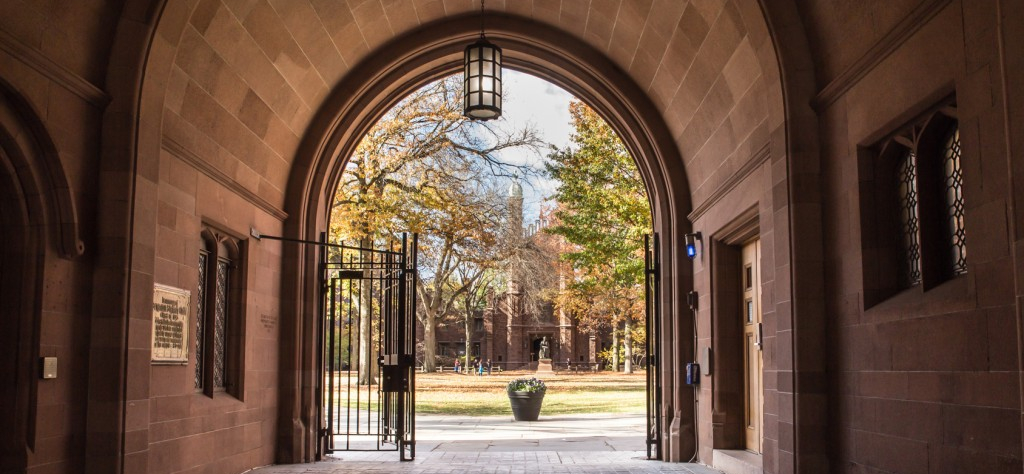With its lengthy history and unparalleled academic rigor, it’s no surprise that Yale tops many students’ best-fit lists, with an admission rate that has dipped below 5% in recent years. Given the competitive nature of Yale’s admissions process, every component of your college application is going to be crucial, including supplemental essays. Like many colleges, Yale has several writing prompts that students are required to answer as part of their submission. Keep reading to learn more about the Yale supplemental essay to make sure your writing sets you apart from the pack.
How Many Supplemental Essays Does Yale Have?
Yale University requires a supplemental essay as well as responses to several short answer questions. All students respond to three short answer questions that ask about their academic interests and why they have decided to apply for Yale. Students who apply through the Common Application or the Coalition Application must also respond to four additional short answer questions, each with a maximum character count of 200. Additionally, applicants must choose one of three supplemental essay prompts to respond to in 400 words or fewer.
How to Tackle Yale’s Short Answer Questions
Given Yale’s competitive admissions process, the bar for each supplemental essay is exceptionally high. If you want to learn more about how to get into Yale, keep reading for tips on how to tackle each of their short answer and supplemental essay prompts.
Short Answer Prompt #1
Students at Yale have time to explore their academic interests before committing to one or more major fields of study. Many students either modify their original academic direction or change their minds entirely. As of this moment, what academic areas seem to fit your interests or goals most comfortably? Please indicate up to three from the list provided.
This prompt only requires you to list the programs you’re interested in and nothing more.
Short Answer Prompt #2
Tell us about a topic or idea that excites you and is related to one or more academic areas you selected above. Why are you drawn to it? (200 words max)
The admissions officers want to get a sense of each applicant’s genuine academic passion. They want to know why mechanical engineering appeals to a student or why they are drawn to theater. To answer this short answer question successfully, make sure your response makes it clear exactly where your academic interests lie, and, more importantly, why you are interested. Check out this example:
My journey into premodern art history began almost accidentally. While researching my passion for South Asian graphic art, I discovered the cross-cultural exchanges between South and Southeast Asia dating back to the first millennium CE. I explored this history with a focus on ancient Funan and Srivijaya, reading works from scholars like Himanshu Ray and Pierre-Yves Manguin about Buddhism’s role as a political tool for rulers.
As I pored over artifacts, comparing Ray’s interpretations of maritime trade networks with Manguin’s insights on kingdom formations, I discovered how rulers in the 5th and 6th centuries strategically deployed Buddhist narratives in stone inscriptions, transforming religious ideology into political language. Each pottery shard concealed layers of political negotiation I’d never imagined existed. What started as a narrow research project revealed how religion, power, and material culture intertwined in premodern Southeast Asia. Cultural artifacts, from the premodern period to the present, are powerful instruments of social transformation, challenging existing power structures and creating spaces for alternative narratives to emerge.
At Yale, whether studying nature in colonial Indian art with Professor Arora or American urban landscapes with Professor Rubin, I want to trace connections between visual narratives and lived realities to illuminate human experience.
Short Answer Prompt #3
Reflect on how your interests, values, and/or experiences have drawn you to Yale. (125 words max)
This is a version of the classic “why this college?” essay prompt. Use this opportunity to demonstrate your interest in attending Yale specifically: Name specific professors and courses you’re interested in taking and student-run clubs you would be eager to join. Emphasize what Yale is known for as it relates to your criteria for your undergraduate experience — show that you’ve done your research, as the example below demonstrates:
I’ve always been drawn to academic exploration and the performing arts, passions that shape who I am. Without both, I feel incomplete. Yale’s Multicultural Open House, webinars, and Yale Young Global Scholars have connected me with its ethos, showing me Yale is the ideal place to pursue and expand my diverse interests. Its interdisciplinary approach offers opportunities to explore the intersection of music, neuroscience, and physics through courses like The Physics of Music as well as in freshman fellowships. The Shen Curriculum’s co-curricular studies and the vibrant performance scene will help me push my artistry to new levels, whether writing a musical about Mexican laborers in the Bracero Program or playing timpani in Yale’s Symphony Orchestra, all within a community that appreciates creativity and curiosity.
Common and Coalition App Short Answer Prompts
Students applying to Yale via the Common App or Coalition Application must respond to the following questions in 200 characters or less:
- What inspires you?
- If you could teach any college course, write a book, or create an original piece of art of any kind, what would it be?
- Other than a family member, who is someone who has had a significant influence on you? What has been the impact of their influence?
- What is something about you that is not included anywhere else in your application?
Your responses to these questions will give admissions officers a clearer picture of who you are as a person. Feel free to be creative and authentic but also be brief!
How to Write the Yale Supplemental Essay
Writing the Yale supplemental essay can feel like a daunting task, but it’s also a incredible opportunity to showcase your personality, passions, and unique experiences beyond your academic transcript. This essay is where you can truly distinguish yourself from other applicants and demonstrate how your individual qualities align with Yale’s intellectual and social community. Think of them as a chance to have a personal conversation with the admissions committee, revealing what makes you, you, and how you’ll contribute to the campus community. Approaching these prompts strategically and authentically is key to making a memorable impression.
Supplemental Essay Prompt #1
Reflect on a time you discussed an issue important to you with someone holding an opposing view. Why did you find the experience meaningful? (400 words max)
For this prompt, think of an example that shows your willingness to listen and hold important conversations with other people in a respectful way. The trick here is to balance your own convictions with the understanding that you are not always right about everything and are excited about the opportunity to embrace others’ perspectives. Use the example below to inspire your own response.
View Example
“If you could live at any time, anywhere in the world, where would it be?” probes a friend, offering a hypothetical to conclude one late-night discussion. I answer, “Enlightenment Paris; I imagine their discussions might resemble ours.” Many summer nights, my friends and I would gather on someone’s basement floor and ponder convoluted theories before contentedly wandering home.
One such night, we were discussing the Israel-Palestine conflict, and another friend asked me what I thought about the draft. Without thinking much about my response, I quickly voiced my opposition to the policy throughout American history and in any theoretical future conflict. When she asked if I would personally evade the draft, I responded, “Yes,” and explained my firm belief in the moral need to resist all forms of war.
My friends surprised me as many of them disagreed with me, leaving us divided on the issue. Most vocally, one friend argued that draft evasion is inherently self-centered. Why should my personal morals against war, he asked, exempt me from a service that my peers and friends must complete? We considered the repercussions of past iterations of the draft and its reputation for perpetuating inequality. To start, the inclusion of only men is inherently unequal, and lower-class and minority Americans have historically been drafted at higher rates than their well-off, white counterparts. In the hypothetical situation where I would evade the draft, I wouldn’t want to perpetuate this tradition of inequality. But I also couldn’t overlook the horrific and inherently immoral nature of war. My head spun.
Driving home that night, I wasn’t exactly sure what I thought about the draft, and this gray area left me feeling uneasy. I struggled to part with my previously clear-cut view of the issue. My friends’ questions and insights forced me to reconsider a longstanding view of draft evasion as a noble cause and reconcile two somewhat conflicting but important personal convictions: an opposition to both war and civil inequality. It wasn’t that my original stance had been wrong so much that it failed to consider the broader implications of draft evasion. This experience taught me that even my most strongly held opinions should be subject to revaluation and openness to new perspectives. This isn’t easy, but it’s important.
At Yale, I hope to build relationships with fellow students who are similarly willing to challenge my beliefs: No subject of discussion is off-limits.
Supplemental Essay Prompt #2
Reflect on your membership in a community to which you feel connected. Why is this community meaningful to you? You may define community however you like. (400 words max)
Don’t just list a group you’re part of — delve into the impact this community has had on you and the role you play within it. Think about how this community has shaped your perspectives, values, or goals. Add details to bring the reader into this community and make it more personal. This essay is a great example.
View Example
As I walked into the retirement community to join a music therapy session, I wasn’t nervous. I love spending time with my grandparents and looked forward to bonding with the residents. But as I entered a code to access the memory care unit, which houses dementia patients, I began to realize this experience might not be what I had anticipated. At my first session, several residents had fallen asleep, and one woman kept complaining that she had to be there.
The music therapist began strumming his guitar and invited me to play my flute. When I finished playing “My Favorite Things,” I was met with blank stares. I focused all my attention on the piece, unsure of how to start a conversation. When the session ended, the therapist explained to me that the point wasn’t just to enjoy music together, but also—and perhaps more importantly—to bring the residents together.
Although I tried to follow his advice, my first few weeks with the group alone were shaky. I felt bad when I asked questions and people could not hear me; many of the residents dozed as I played. Determined to brighten the mood, I brought in a new batch of sheet music. I began with “This Land is Your Land,” which earned some claps and humming. Some people recalled singing the song in school, and I excitedly shared that I had done the same. When I started playing “Take Me Out to the Ball Game,” I saw people’s faces slowly crinkle into smiles, and, to my delight, was even joined by some singing. I had finally found a song that brought everyone together.
When I discovered how music selections could energize the residents, I became motivated to find new ways to connect to the group. Even though residents often struggled to recall their favorite songs, the staff helped me tailor my music to the residents. Two years later, I play songs by Brooklynites—like Neil Diamond or Barbra Streisand—that inspire residents to share memories of our neighborhood. I discuss flute with a former recorder teacher, and bond over a shared love of the Carpenters with another resident. Music has transformed from an intellectual pursuit to a community-driven calling, inspiring me to research music’s effects on the brain and heart. Best of all, I have become part of the community myself, savoring its perspective and joy.
Supplemental Essay Prompt #3
Reflect on an element of your personal experience that you feel will enrich your college. How has it shaped you? (400 words max)
The most important word in this prompt is “reflect.” Instead of simply stating an achievement, focus on the journey, the challenges, and the lessons learned as well as how this experience will inform your contributions to campus life. Ultimately, your response should highlight your growth, your values, and your potential to positively influence those around you at Yale. Let’s look at an example of an essay that worked.
View Example
I don’t confine music by posture. 5th grade me yawns as I play through Mozart’s “Sonata in C” again. C major can be so plain. I fight to keep my interest in this piece, when suddenly…what if? I turn my bench around, slide onto my back, now completely upside-down. I fumble around to find the starting position and let muscle memory take hold—suddenly, I’m having so much fun playing from this new perspective. Later, I learned that this was actually how younger Mozart liked playing, too.
I don’t confine music by roles. I participated in a chamber music trio (piano, bassoon, and clarinet) in my sophomore summer. At first, our professor sternly told me to pull back on my rubato because the piano should simply provide a base. I wasn’t convinced, given Beethoven’s intensity. I experimented and infused more contrast and romanticism into the “accompaniment.” Our trio group felt even stronger synergy between all three instruments after this shift. When we let it all out in our final performance, the professor exclaimed, “An excellent rendition with unforeseen dynamics!” My co-players thanked me for helping transform what would’ve been a more monotone experience into a meaningful musical process for all of us.
I don’t confine music by imagination. Many times, the books I read or the games I played are so spectacular that they beg to be infused with additional colors, which led to my hobby of composing orchestral soundtracks. The underlying narratives add extra dimensions to the already-beautiful music, which strengthened my resolve to always be on the lookout for new dimensions to perceive.
I don’t confine the lessons I learn from music to just music; they’re also essential to humanity. Hans Zimmer created masterpieces by reimagining the senses, and Copernicus made his discovery by looking from the sun’s perspective instead of the Earth’s. As a musician, I am not confined by postures or assumptions, and that’s how I like to approach everything—striving to be a learner with curiosity, a friend with impartiality, and an apprentice of life with ingenuity.
To really enrich a community, it takes more than one to explore unconventional approaches and challenge norms. In college, whether I join an orchestra, converse with others about the universe, or simply play poker with my roommates, I hope to invite everyone to join me in turning upside-down and having fun discovering something new together.
Ace Your Yale Supplemental Essays with IvyWise
There’s no doubt that acing the Yale supplemental essays takes effort. Students need to start drafting their responses well in advance to ensure they’re presenting themselves in the best light possible. If you’re looking for personalized college admissions assistance, our team is here to help.
Get Started




